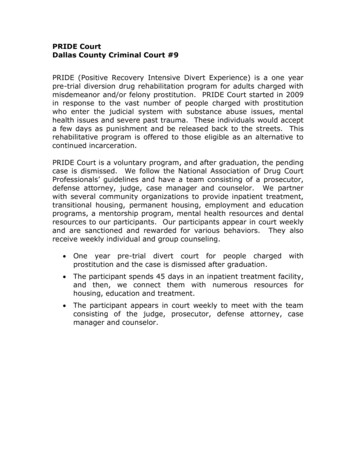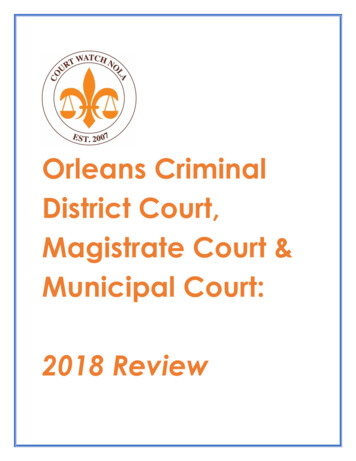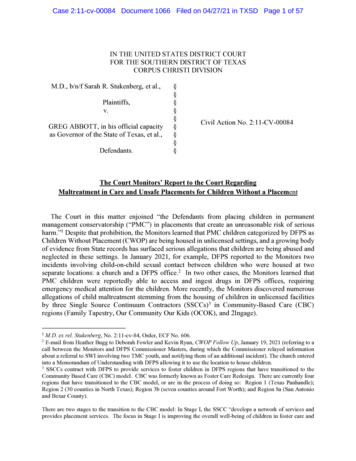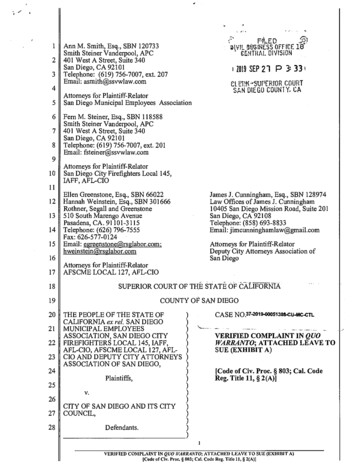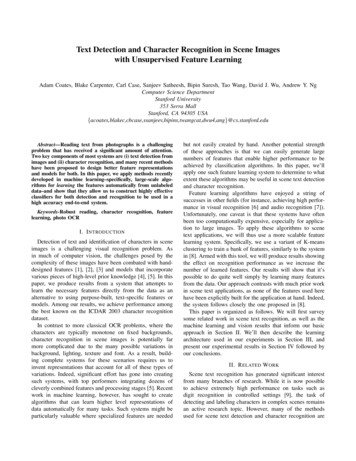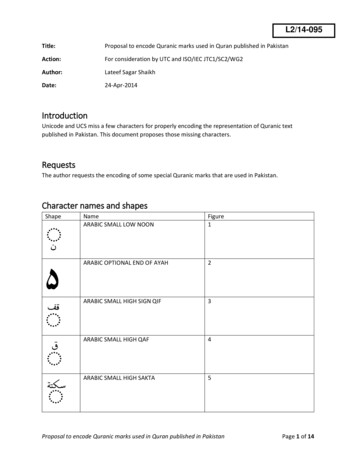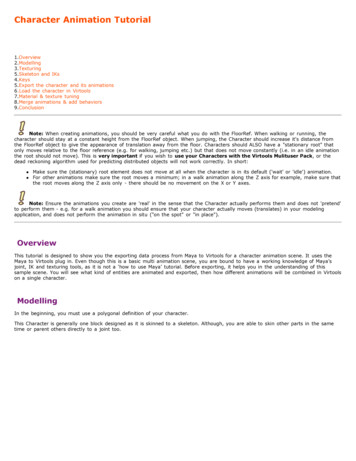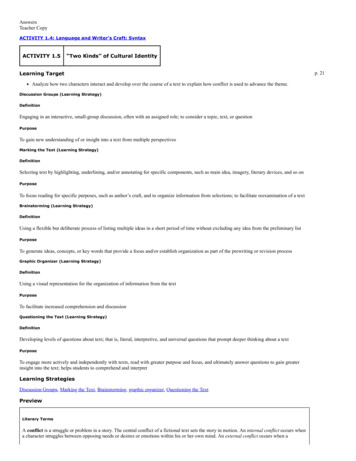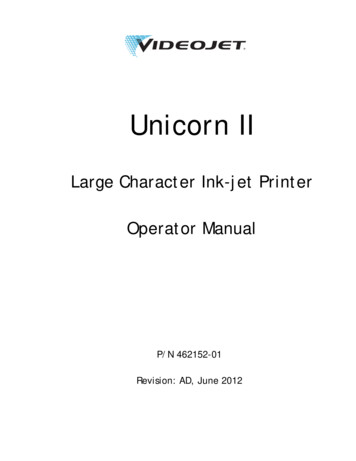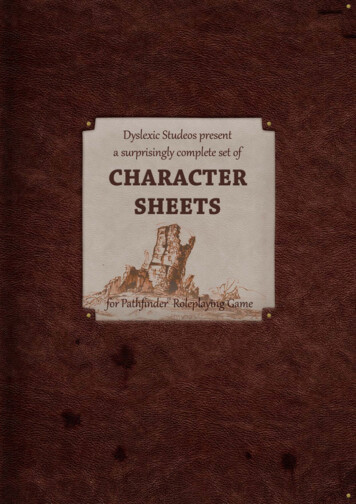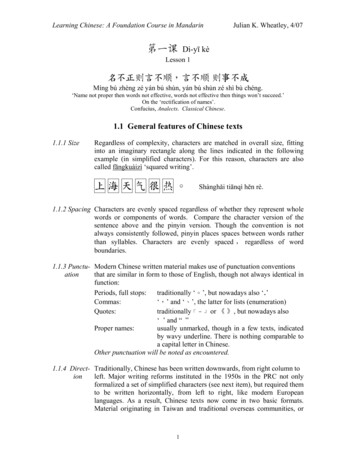
Transcription
5*677//3(g. H. wcombe.Jit. 1. lonb:
. ST
ENA. W LricfVs.BEING AN EYE, AND EARE WITNESSE.QUINESCITDISSIMULARE,NESCIT REGNARE.LONDON:PrintedbyR.J.and are to be sold byJohn Wright, at theKing’s Headin the Old Baily.M.DC.L.iiteprintelJ 6g 8, Smeeton, St. JBaitin’e fjutdj garlr, fjatmfl rose.1817,
vhistoricalMEDICALV fiRHOWLETT AND BRIMMER, PRINTERS,FRITH STREET, SOHO.
THE PUBLISHER TO THE READER.AMONGST the many remarkable passages in this short relation, the Readermay take notice of five things here discovered.First, how Almighty God was mockt, and the world abused, by TuesdaySermons at Court, and the Anniversary Festivals upon the fifth of August,in commemmorationof King James’sdeliverance from the Gowrie’s con spiracy ; whereas indeed, there was no such matter,but a mere feignedthing, as appears by the story.Secondly, how this kingdom was gulled in the supposed treason ofSir Walter Rawley and others, who suffered as Traytors; whereas, to thisday, it could never be knowne that ever there was any such treason; but amere trick of State to remove some bloches out of the ivay.Thirdly, the fearful imprecation made by King James against himselfeand his posterity, in the presence of many of his servants, and the Judges,even upon his knees, if he would spare any that were found guilty jn thepoysoning businesse of Sir Thomas Overbury; but how he failed this storywill tell you; and how the justice of God hath been and is upon himselfeand posterity, his owne death, by j)oyson, and the sufferingsof his pos terity, doe sufficiently manifest.Fourthly, the untimely deathof that hopeful Prince Henry is herepartly discovered; if the Reader cannot inthis discourse spellby whathand hee was taken away, yet may he observe a strange connivance at,and contentednesse with the thing done.Fifthly, here we may see what a slave King James teas to his Favou rites ; this appears by many passages of this story, but especially, by hispassion at Greenwich,' whenSomersets threateningthespeeches,Lieutenant of the Towerandby hisagony, tillSomerset took his arraignment patiently, and had told no talcs.told him ofhe heard that
IVThe summa totalis of all that I commend fromthis discourse to theReader, is, that he would give glory to God, in acknowledging his justice,in ruining that family, by which the eyes of his glory have been so muchprovoked;the foundation whereof ivasfinished in the Sons;laid in the Father’s reigne, andand hereby we may clearly seethe truth of God’sivord, when he said; They that honour me I will honour them, but theythat despise me shall be lightly esteemed.Lastly, 1 takethe boldnesse to advise all that are faithfull intheLand to take heed how they side with this bloody house, lest they be foundopposers of God’s purpose, which doubtlesse is, to lay aside that family,and to make it an example to posterity ; according to the several impre cations both of King James and King Charles.
THECOURTofKING JAMES;ORA general Discourse of some secret passages in State,Since the Death of that ever-glorious Queen Elizabeth,Until this present.By the Authors own observation, who was either an eye,or eare witness, or from such as were actors in them,from their own relation.ON the twenty-fourth of March, 1602, did set the most glorious Sun that ever shined in our Firmament of England, ! jl(the never to be forgotten Queen Elizabeth, of happygjfniiTimi f memory) about three in the morning, at her Manour ofRichmond, not only to the inspeakable grief of her Ser vants in particular, but all her Subjects in general.*And although many of her Courtiers adored that rising Sun,appearing in the North, yet since (not without regret) of their mon strous ingratitude to that Sun now set, and in peace.No sooner was that Sun set, but Sir Robert Carew (her nearKinsman, and whose Family, and himself, she had raised from thedegree of a mean Gentleman, to high honor, in title and place) mostingratefully did catch at her last breath, to carry it to the rising Sunthen in Scotland, notwithstanding a strict charge laid to keep fast allthe Gates, yet, his Father being Lord Chamberlaine, he by that meansfound favour to get out, to carry the first news; which although itobtained for him the Governourship of the Duke of York, yet hathset so wide a mark of ingratitude on him, that it will remain to posterity j B
2COURT AND CHARACTERa greater blot, than the honour he obtained afterward, will ever wipeout.About nine in the morning of that day, was proclaimed King Jamesof blessed memory, by the name of James the first; and now nothingon all hands, but preparations for accommodating him in his journeyfor England, many posting into Scotland for preferment, either byindearing themselves by some merit of their own to the King, or bypurchasing friends with their purses, (Gold and Silver being a preciouscommodity in that Climate, and would procure any thing) and didprocure Suits, Honours, and Offices to any that first came ; of all whichthe King afterward extended his bounty, in so large and ample a manner,as procured his own impoverishment, to the pressure of his Subjects, sofar as set some distance between him and them, which his wisdom,and Kings craft, could easily at all times reconcile.The first that came from the King to the Lords in England, to giveorder for all things necessary for the expediting his journey towardsEngland, was Sir Roger Aston, an English man born, but had hisbreeding wholly in Scotland, and had served the King many years ashis Barber, an honest and free-hearted man, and of an ancient Familyin Cheshire, but of no breeding answerable to his birth; yet he was theonly man ever employed, as a Messenger from the King to Q. Elizabeth,as a Letter carrier only, which expressed their own intentions withoutany help from him, besides the delivery, but even in that capacitywas in very good esteem with her Majesty, and received very royalrewards, which did inrich him, and gave him a better Revenue thenmost Gentlemen in Scotland; for the Queen did find him as faithfulto her as to his Master, in which he shewed much wisdom, though ofno breeding. In this his imployment I must not pass over one prettypassage, I have heard himself relate ; That he did never come to deliverany Letters from his Master, but ever he was placed in the Lobby;the Hangings being turned him, where he might see the Queen dancingto a little Fiddle, which was to no other end, then that he should tellhis Master, by her youthful disposition, how likely he was to cometo the possession of the Crown he so much thirsted after; for you mustunderstand, the wisest in that Kingdom did believe the King shouldnever enjoy this Crown, as long as there was an old Wife in England,which they did believe we ever set up, as the other was dead.Sir Roger Aston presenting himself before the Councel, being buta plain untutored man, being asked how he did, and courted by allthe Lords, lighted upon this happy reply; even my Lords, like a
OF KING JAMES.3poor man, wandring above forty years in a Wilderness, and barrenSoyl, am now arrived at the Land of Promise. This man was after ward made Gentleman of the Bed-chamber, Master of the Wardrobe,and invested with such Honours and Offices as he was capable of,and that enabled him to live in a noble way, during his life, and toleave his Daughters great Fortunes; but had you seen how the Lordsdid vye courtesies to this poor Gentleman, striving who should ingrossthat Commodity by the largest bounty; you could not but havecondemned them of much baseness, especially, seeing when at thistime, Offices, and great places of Honor will not be accepted from thatSon, the Barber of whose Father was so much courted, but to speaka good word in their behalf's; surely the times are much altered.And now all preparation was made to meet the King in Yorke,that he might in that Northern Metropolis appear like a King of England,and take that State on him there, which was not known in Scotland.There met him all the Lords of the Councel, and there did they allmake Court to the Scotch-men that were most in favor with the King,and there did the Scotch Courtiers lay the first foundation of their EnglishFortunes; the chief of them was Sir George Heivme, a kind of Favou rite, but not such as after appeared with young Faces, and smooth Chins,but one that for his wisdom and gravity, had been in some secret Councels with his Master, which created that dearness between them; andthe chief of those secrets was that of Gowries Conspiracy, though thatNation gave little credit to the Story, but would speak both slightlyand despitefully of it, and those of the wisest of that Nation; yet therewas a weekly commemoration by the Tuesday Sermon, and an anni versary Feast as great as it was possible, for the preservation, ever onthe fifth of August, upon which day as Sir John llamsey, after Earlof Holder nes, for his good service in that preservation, was the principalGuest, so did the King grant him any Boon he would ask that day;but had such limitations set to his asking, as made his Suit as unpro fitable unto him, as that he asked it for, was unserviceable to the King,and indeed did make the English believe as little the truth of thatStory, as the Scots themselves did, and yet on my conscience the goodGentleman did in that as a Lyer often doth, by telling a Lye oftenbelieveth it to be a very truth ; but the truth was, (although he wasnot a man capable of much himself) yet had it been true, there wastoo little done for him, being not true too much; for being an Earl hewas in very little esteem, either with his Master, or with the bettersort of Courtiers. And I pray God that the effects of those Sermons
4COURT AND CHARACTERin the Fathers time for that service, cause no ill effects, or be not onecause of Gods anger with us in the Sons reign.This Sir George Hewme being the only man that was the Guiderof the King, and his affairs, all the wiser sort of English made theiraddresses unto him, amongst those Sir Robert Cecil, a very wise man,but much hated in England, by reason of the fresh bleeding of thatuniversally beloved Earl of Essex, and for that was clouded also inthe Kings favour; he came to York, but lay close, unseen, or scarceknown to be in the City, until he knew what entertainment he shouldreceive from the King; for he was in his own, and all mens opinions,so under the Hatches, as not ever to appear above board again (nordid any of the Counter-faction to Essex, besides himself, ever attaineto the Kings favour;) but those friends raised by his wit, and purse,did so co-operate (of which Sir Roger Aston, that plain man wasprincipal, for which he lost not his labour) that Sir George Hewme,and Sir Robert Cecil had many secret meetings, did so comply tothe admiration of all, did appear, and come out of his Chamberlike a Giant, to run his race, for Honor, and Fortune; and whoin such dearness, and privacy with the King, as Sir Robert Cecil:as if he had been his faithful Servant many years before; yet didnot either his Friends, wit or wealth, raise him so much (as somebelieve) as the ill offices done by him to this Nation, in discoveringthe nature of the people, and shewing the King the way, how toenhance his Prerogative so above the Laws, that he might inslavethe Nation, which though it took well then, yet it hath been of sadand dangerous consequences in after times; for first, he causeda whole Cart-load of Parliament Presidents, that spake the Subjectsliberty, to be burnt ; next, raising two hundred thousand pound formaking two hundred Baronets, telling the King, he should find hisEnglish Subjects like Asses, on whom he might lay any burthen, andshould neither Bit nor Bridle, but their Asses ears; and when theKing said, It would discontent the generality of the Gentry, he replyed ;Tush, Sir, you want the money, that will do you good, the honorwill do them very little; and by these courses he raised himself, friends,and family, to Offices, Honors, and great Possessions, yet as a punish ment, he lived long enough to have lost all, had not death preventedhim between the Bath, and London; for the Duke of Bullion beingthen here, about the overture of that unfortunate Match between thePalsgrave, and the Lady Elizabeth, had so done his errand, and dis covered his jugling; it is most certain, he had been stript of all at
OF KING JAMES.5his return, which he well understanding from his friends at Court, didexpedite his end; but he dyed opportunely to save his honor, andestate, for his Posterity, though to leave a mark of ignominy on himselfby that Herodian disease, that for all his great Honors, and Possessions,and stately Houses, he found no place but the top of a Mole-hill, nearMaleborough to end his miserable life; so that it may be said of him,and truly, he dyed of a most loathsome Disease, without house, withoutpity, without the favour of that Master that had raised him to so highan estate; and yet must he have that right done him (which is alsoa note of the misfortune of our times) there hath not been any sincehis time that equalled him to fulfil the Proverb, Seldom comes a better;he had great parts, was very wise, full of honour, and bounty, a greatlover and rewarder of Virtue, and able parts in others, so they didnot aspire too high in places, or look too narrowly into his actions.The next came on the public Theatre in favour, was HenryHoward, a younger Son of the Duke of Norfolk, and Lord ThomasHoward, the one after Earl of Northampton, the other Earl of Suffolk,Lord Chamberlain, and after Lord Treasurer, who by Salisburiesgreatness with that Family, rather then by any merit, or wisdom inthemselves, raised many great Families of his Children; Northamptonthough a great Clerk, yet not a wise man, but the grossest Flattererof the World, and as Salisbury by his Wit, so this by his Flattery,raised himself; yet one great motive to the raising o
Thirdly, the fearful imprecation made by King James against himselfe and his posterity, in the presence of many of his servants, and the Judges, even upon his knees, if he would spare any that were found guilty jn the poysoning businesse of Sir Thomas Overbury; but how he failed this story will tell you; and how the justice of God hath been and is upon himselfe and posterity, his owne death .
